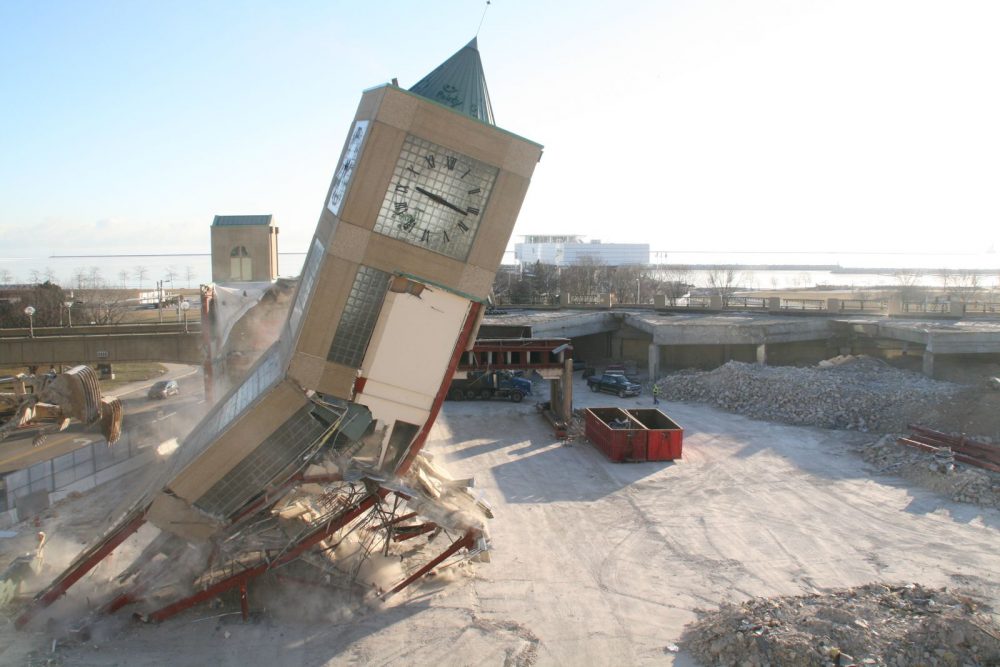Can City Prevent Miami-Like Disaster?
Bauman grills officials. Should Milwaukee ramp up building inspections?
At approximately 1:30 a.m. on June 24th a 12-story condominium building in a Miami suburb collapsed. Five days later, approximately 150 people are missing and the confirmed death toll continues to rise.
“I was following this story with horror,” said Alderman Robert Bauman to members of the Zoning, Neighborhoods & Development Committee on Tuesday morning. His district encompasses Downtown and the Near West Side, where almost all of the city’s tallest buildings are located.
“Obviously we do examinations in the beginning,” he said of construction. “I was just curious what we do 20 years in, 40 years in.”
“We are always putting our eyes on properties,” said DNS Commissioner Erica Roberts. She ran through a list of opportunities for problems to be noticed, including fire safety inspections, sprinkler inspections, cross-connection inspections and facade inspections. “We have other inspections that put people that have trade and industry knowledge in buildings.”
But as both Bauman and Roberts noted, those inspections aren’t for structural integrity. Roberts said inspectors will note other problems they see, but they have to be able to see them. Things like drywall can obscure problems.
“A lot of what we are looking at is hidden within the walls of properties,” said Roberts of the challenge.
The newest of the city inspection programs is the facade inspection program. It went into effect in 2001 after multiple incidents where pieces of building facades fell to city streets. A three-foot-by-four-foot tile fell from the then-Boston Store Building in August 2020 onto the sidewalk. A piece of the 21-story Wisconsin Tower facade fell in September, damaging a parked car and bicycle. And at least three times in the next year pieces fell from the now-reclad building at 729-739 S. 2nd St.
Roberts said those inspections, performed by a third party, are important because they can reveal unseen internal issues.
But she said the city doesn’t have ordinances similar to Miami where the structural integrity of a building is inspected on a set schedule. Roberts added that she doesn’t have any inside knowledge of the Florida collapse beyond what has been publicly reported. Each day since the collapse new reports have come out on known issues with the structure.
“[The] building code tends to be reactive,” she said of any potential changes. “We see that when there are large casualities, large fires.”
She said DNS didn’t have the in-house capacity to perform structural integrity inspections and she’s not sure the city should require it. “I would be cautious to create a project that adds additional costs to property owners,” said Roberts.
Bauman is prepared to create one.”I can see a whole new regimen being created to do post-construction inspection of buildings,” he said.
“For those watching at home, I don’t want the public to panic either,” Roberts cautioned. “The climate in Florida is very different.”
A more recent example was the 2010 failure of the supports on an ornamental concrete panel on the O’Donnell Park parking structure that resulted in the death of a 15-year old and injured two other people. A civil jury found the manufacturer, Advance Cast Stone, mainly responsible, awarded $39 million in damages and said the company concealed a defect or deficiency in the concrete panels’ installation.
The commissioner said she didn’t want to leave the impression that DNS is not evaluating buildings. “We do respond to complaints as well for this type of issue. We are not sitting back waiting for things to collapse,” she said.
At Bauman’s request, DNS operations director Michael Mazmanian detailed how the city inspectors check construction sites including comparing work to stamped engineering drawings.
What about concrete and other materials? “Most jobs are doing slump tests before they pour,” said Mazmanian of concrete foundations and structures. The test, which creates a cylinder of concrete, ensures that the cement mix has the right consistency. A third-party firm performs the test and city inspectors review that it happened.
The measure was held for potential future discussion. No formal inspection plan is currently pending before the council.
Eyes on Milwaukee
-
Church, Cupid Partner On Affordable Housing
 Dec 4th, 2023 by Jeramey Jannene
Dec 4th, 2023 by Jeramey Jannene
-
Downtown Building Sells For Nearly Twice Its Assessed Value
 Nov 12th, 2023 by Jeramey Jannene
Nov 12th, 2023 by Jeramey Jannene
-
Immigration Office Moving To 310W Building
 Oct 25th, 2023 by Jeramey Jannene
Oct 25th, 2023 by Jeramey Jannene




















http://archive.jsonline.com/news/milwaukee/100290739.html
June 24, 2010
Concrete slab at O’Donnell Park in Milwaukee falls killing 15 year old Jared Kellner.
https://wgntv.com/news/woman-74-dies-after-retaining-wall-collapses-on-her-at-wisconsin-senior-living-facility/
May20, 2020
Retaining wall collapse kills Judith Cisewski at senior living facility.
Just two examples– but what was done by our “leaders” to prevent future catastrophes?